Unpacking 100+ Iconic Proverbs: Meanings and Examples
Hey there, fellow wisdom-seekers! Welcome to our little treasure trove of sayings that have been around longer than your great-grandma’s secret cookie recipe.
We’re about to dive headfirst into the quirky and wonderful world of proverbs…
(those snappy little phrases that pack more wisdom than a wizard’s library).
You know… proverbs are like the ancient version of tweets:
Short…
To the point…
And…
Surprisingly deep.
*(but without the character limit and definitely no hashtags).
They’ve been passed down through generations, like that one sweater everyone seems to have inherited but no one knows where it came from.
“Proverbs are like the ancient version of tweets – short, to the point, and surprisingly deep”
In this thrilling expedition, we’ll unravel over 100 iconic proverbs, decoding WHAT they actually mean…
*(because let’s be honest, sometimes they make as much sense as a screen door on a submarine).
We’ll also toss in some fun examples to show HOW these old-school nuggets of wisdom can still apply in our oh-so-modern lives.
So…
Buckle up! You’re about to become wiser, and maybe, just maybe, you’ll finally understand what your grandma means when she says:
“Don’t throw the baby out with the bathwater.”
*Spoiler alert: Please, don’t actually throw any babies. It’s just a saying. Seriously.
Let’s get proverbial!
List of 100 The Most Popular Proverbs (From A to Z)
“A stitch in time saves nine.”
Meaning: This phrase suggests that addressing a problem or completing a task promptly, even if it requires effort in the present, can prevent bigger issues or more work later on.
Example #1: Sarah noticed a small leak in her roof and immediately called a repairman to fix it. By taking action promptly, she prevented further damage to her home and avoided costly repairs later, illustrating the wisdom of “a stitch in time saves nine.”
Example #2: Tom regularly maintained his car by following the recommended service schedule. As a result, he avoided major breakdowns and costly repairs, proving the value of “a stitch in time saves nine” in vehicle maintenance.
Example #3: Emily discovered a mistake in her project presentation the day before it was due. Instead of ignoring it, she took the time to correct the error, ensuring a polished and professional final product and exemplifying the principle of “a stitch in time saves nine” in her work.
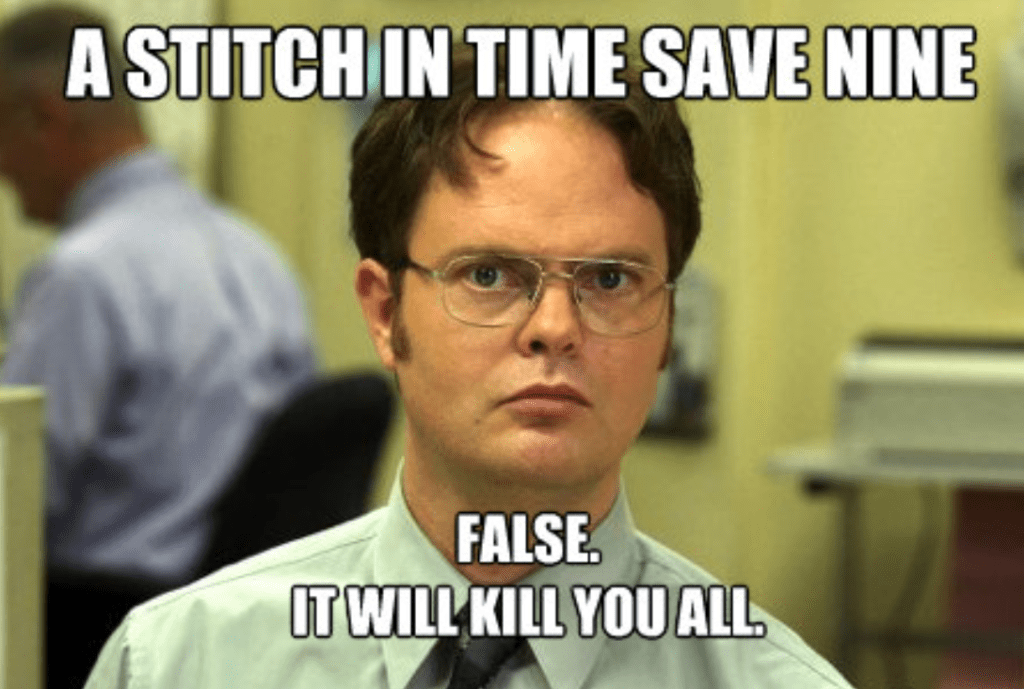
“Absence makes the heart grow fonder.”
Meaning: This phrase suggests that being apart from loved ones or familiar things can increase one’s affection or appreciation for them.
Example #1: Sarah and Tom were in a long-distance relationship, and while they missed each other dearly, they found that “absence makes the heart grow fonder,” as their love for each other grew stronger with each day apart.
Example #2: Emily moved to a different city for work, and while she missed her family and friends, she realized that “absence makes the heart grow fonder,” as she grew more appreciative of the time spent with them when she visited.
Example #3: Tom’s favorite restaurant closed temporarily for renovations, and during its absence, he found himself craving its delicious food even more, experiencing firsthand how “absence makes the heart grow fonder.”
“A rolling stone gathers no moss.”

Meaning: This phrase suggests that someone who is constantly moving or changing jobs, locations, or interests doesn’t accumulate responsibilities or attachments, but also lacks stability or long-term success.
Example #1: Sarah’s friend had traveled to many countries and experienced various cultures, but struggled to find a sense of belonging or establish roots anywhere, exemplifying the idea that “a rolling stone gathers no moss.”
Example #2: Tom changed jobs frequently in pursuit of higher pay or better opportunities, but never stayed long enough in one position to develop expertise or build a successful career, embodying the concept of “a rolling stone gathers no moss.”
Example #3: Emily preferred to explore new hobbies and interests rather than commit to one for an extended period, enjoying the freedom and excitement of trying different things, but not allowing herself to become proficient or deeply invested in any one pursuit, in line with the saying “a rolling stone gathers no moss.”
“A bird in the hand is worth two in the bush.”
Meaning: This phrase suggests that it is better to have a certain benefit or advantage now than to risk losing it by pursuing something potentially greater in the future.
Example #1: Sarah was offered a job with a stable salary and benefits, and although she had dreams of pursuing a higher-paying position elsewhere, she decided that “a bird in the hand is worth two in the bush” and accepted the offer for the security it provided.
Example #2: Tom was considering selling his successful business to invest in a riskier venture with potentially higher returns. However, he ultimately decided that “a bird in the hand is worth two in the bush” and chose to stick with his current business, valuing its stability and proven success.
Example #3: Emily had the opportunity to purchase a modest home within her budget, but she was tempted by the idea of saving up for a larger, more luxurious property in the future. Ultimately, she remembered the saying “a bird in the hand is worth two in the bush” and decided to seize the opportunity for homeownership now, appreciating the security and stability it offered.
“A friend in need is a friend indeed.”
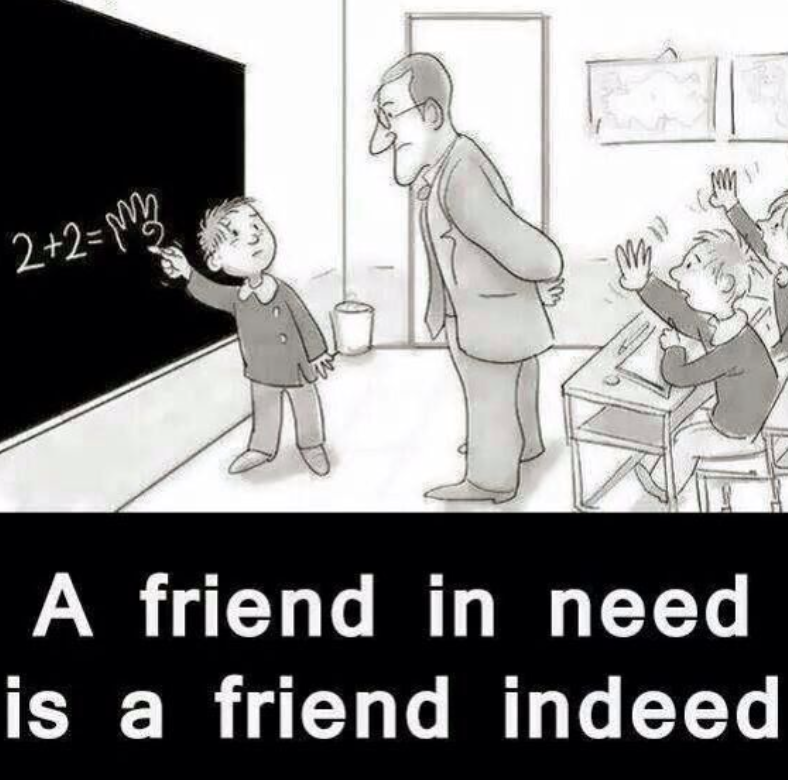
Meaning: This phrase emphasizes that a true friend is someone who supports and helps during times of difficulty or adversity.
Example #1: When Sarah was going through a tough time, her friend Tom was there to lend a listening ear and offer emotional support, proving that “a friend in need is a friend indeed.”
Example #2: Tom needed help moving to a new apartment, and Sarah volunteered to assist without hesitation, demonstrating the meaning of “a friend in need is a friend indeed” by offering her time and assistance when he needed it most.
Example #3: Emily faced a personal crisis, and her friend Sarah dropped everything to be by her side and provide unwavering support, exemplifying the sentiment that “a friend in need is a friend indeed” through her actions.
“A leopard can’t change its spots.”
Meaning: This phrase suggests that it is difficult or impossible for someone to change their fundamental nature or behavior, especially if it is ingrained or innate.
Example #1: Despite promising to reform his reckless ways, Tom soon returned to his old habits of impulsiveness and irresponsibility, proving the adage “a leopard can’t change its spots.”
Example #2: Sarah’s coworker had a history of being unreliable and unreliable, and despite efforts to improve, they continued to demonstrate the same behaviors, affirming the saying “a leopard can’t change its spots.”
Example #3: Despite attending anger management classes, Emily’s brother still struggled with explosive outbursts, leading her to conclude that “a leopard can’t change its spots” and accepting him for who he was.
“A little knowledge is a dangerous thing.”
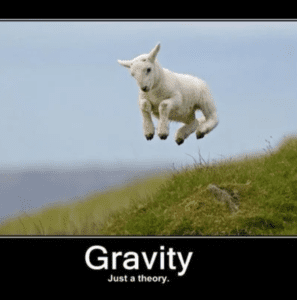
Meaning: This phrase suggests that having only a limited understanding of a subject or situation can lead to misguided actions or decisions, potentially resulting in negative consequences.
Example #1: Tom attempted to fix his car’s engine based on a few online tutorials, but his lack of expertise led to further damage, illustrating the danger of “a little knowledge is a dangerous thing.”
Example #2: Sarah tried to provide medical advice to her friend based on a brief internet search, but her limited understanding of healthcare resulted in incorrect guidance, highlighting the peril of “a little knowledge is a dangerous thing.”
Example #3: Despite having minimal training, Emily attempted to perform complex electrical repairs in her home, resulting in a dangerous situation due to her insufficient knowledge, underscoring the risk of “a little knowledge is a dangerous thing.”
“A man is known by the company he keeps.”
Meaning: This phrase suggests that a person’s character and reputation are influenced by the people they associate with or spend time with.
Example #1: Despite his own integrity, Tom’s reputation suffered because he associated with dishonest and untrustworthy individuals, illustrating the truth of “a man is known by the company he keeps.”
Example #2: Sarah’s friends were known for their hard work and dedication, and she was respected by association, demonstrating the influence of “a man is known by the company he keeps” on her reputation.
Example #3: Emily distanced herself from negative influences and surrounded herself with positive and ambitious individuals, understanding the importance of “a man is known by the company he keeps” in shaping her character and reputation.
“An apple a day keeps the doctor away.”
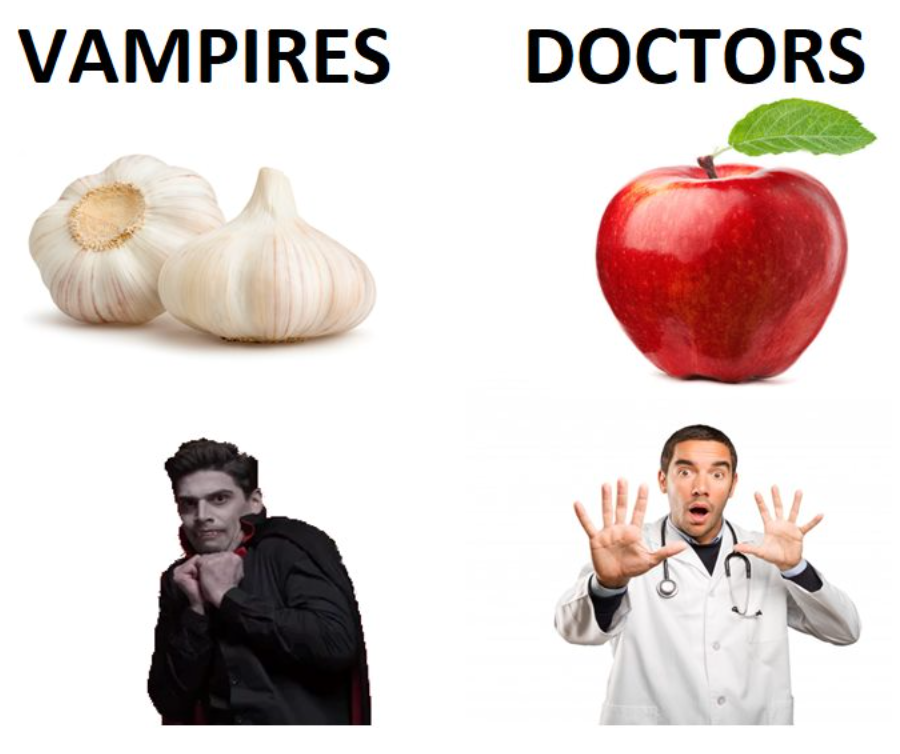
Meaning: This phrase suggests that consuming nutritious foods, such as apples, regularly can contribute to good health and prevent the need for medical attention.
Example #1: Sarah made it a habit to include an apple in her daily diet, believing in the health benefits of “an apple a day keeps the doctor away” and aiming to maintain her well-being.
Example #2: Tom decided to incorporate more fruits and vegetables into his meals, starting with eating an apple every day to adhere to the adage “an apple a day keeps the doctor away” and prioritize his health.
Example #3: Emily encouraged her family to eat apples regularly as part of their balanced diet, emphasizing the importance of “an apple a day keeps the doctor away” in promoting their overall health and wellness.
“Actions speak louder than words.”
Meaning: What a person actually does is more significant and revealing than what they just say they will do.
Example #1: Alex always talked about helping the environment but never actually did anything. His sister, Emma, on the other hand, started a recycling program at her school, proving that actions speak louder than words.
Example #2: When Sarah’s friend kept promising to visit but never did, Sarah realized that actions speak louder than words, and it was time to reassess the friendship.
Example #3: During the team project, Jack kept saying he was a team player but never helped out. Meanwhile, Lisa quietly took on extra work to ensure the project’s success, showing that actions speak louder than words.
“All good things come to those who wait.”
Meaning: Being patient often leads to better outcomes and rewards.
Example #1: Max was eager to buy the latest smartphone, but he decided to wait until the price dropped. A few months later, he bought it at a discount, showing that all good things come to those who wait.
Example #2: Emily was anxious to hear back from her college applications. She reminded herself that all good things come to those who wait, and her patience paid off when she was accepted to her top choice.
Example #3: When Leo’s friends all started dating, he felt left out. But he chose to wait for someone truly special, and eventually met the perfect partner, proving that all good things come to those who wait.
“All is fair in love and war.”

Meaning: This suggests that in certain situations, like romantic relationships or during conflicts, people are allowed to behave in ways that would normally be considered unacceptable.
Example #1: When two best friends, Jake and Ryan, found out they were both interested in the same person, Jake said, “Well, all is fair in love and war,” understanding that they might have to compete for her attention.
Example #2: During a competitive game at school, Mia and her team bent the rules a bit to win. Her coach reminded them that not everything is like love and war, where all is considered fair.
Example #3: When two companies were vying for the same lucrative contract, they each used aggressive marketing tactics, justifying it with the idea that all is fair in love and war.
“All that glitters is not gold.”

Meaning: This expression warns that something looking valuable or true on the outside may actually be less valuable or false.
Example #1: When Ben saw an ad for a smartphone at an unbelievably low price, he remembered that all that glitters is not gold, and decided to research more before buying.
Example #2: Ella was captivated by the glamorous lifestyle of celebrities on social media, but her mother reminded her that all that glitters is not gold, and those lives might not be as perfect as they seem.
Example #3: Carlos was offered a job with a high salary at a new company, but upon learning about their poor employee treatment, he realized that all that glitters is not gold and turned down the offer.
“A penny saved is a penny earned.”
Meaning: This saying emphasizes the value of saving money, equating it to earning money, as both contribute to financial well-being.
Example #1: Sophie decided not to buy a coffee on her way to school, thinking, “A penny saved is a penny earned,” and put that money into her savings for a new bike.
Example #2: Instead of going out to eat, Max cooked dinner at home, reminding himself that a penny saved is a penny earned, and watched his savings account grow.
Example #3: Lily was about to buy a designer dress but then chose a less expensive one, understanding that a penny saved is a penny earned, and used the extra money to add to her college fund.
“A picture is worth a thousand words.”
Meaning: This expression suggests that a complex idea can be conveyed with just a single image, which can be more impactful than a lengthy description.
Example #1: When Ryan wanted to explain the beauty of the sunset he saw on his trip, he showed his friends a photo, knowing that a picture is worth a thousand words.
Example #2: For her school project on deforestation, Mia used a powerful image of a barren landscape instead of a long essay, demonstrating that a picture is worth a thousand words.
Example #3: To capture the emotion of the charity event, the photographer focused on candid shots of the participants, believing that a picture is worth a thousand words in telling the story.
“A watched pot never boils.”
Meaning: This phrase suggests that time feels longer when you’re waiting for something to happen, especially if you’re constantly checking on it.
Example #1: Tom kept checking the clock every minute while waiting for his exam results, and his mom said, “Remember, a watched pot never boils,” reminding him to be patient.
Example #2: Julie was so excited about her online order’s arrival that she kept refreshing the tracking page. Her brother laughed and remarked, “A watched pot never boils, Julie. It’ll come when it comes.”
Example #3: Waiting for his favorite game to download, Alex stared at the progress bar. His dad noticed and advised, “A watched pot never boils. Why don’t you do something else while it finishes?”
“Beauty is in the eye of the beholder.”
Meaning: This saying expresses that the perception of beauty is subjective and different people may find beauty in different things.
Example #1: When Sarah showed her friends the abstract painting she bought, they were confused. But she smiled and said, “Beauty is in the eye of the beholder,” loving the uniqueness of the art.
Example #2: At the dog park, Jake’s friends didn’t understand why he adored his scruffy, odd-looking dog until he explained, “Beauty is in the eye of the beholder,” expressing his affection for his pet’s unique charm.
Example #3: Emily preferred her old, cozy house over modern apartments. When her friends wondered why, she simply said, “Beauty is in the eye of the beholder,” feeling truly at home in its familiar warmth.
“Better late than never.”
Meaning: This phrase suggests that it’s better to do something late than not do it at all.
Example #1: When John finally turned in his late assignment, his teacher said, “Well, better late than never,” happy that he completed it despite the delay.
Example #2: After years of putting it off, Olivia started learning to play the piano in her thirties and thought, “Better late than never,” as she enjoyed her new hobby.
Example #3: Mike apologized to his friend for forgetting his birthday, and his friend replied, “Better late than never,” appreciating the late but sincere gesture.
“Better safe than sorry.”
Meaning: This phrase means it’s better to be cautious now than to regret a possible future mishap.
Example #1: Before leaving for vacation, Emily double-checked that she had locked all the doors and windows, thinking, “Better safe than sorry.”
Example #2: Alex always wears a helmet when he goes skateboarding, telling his friends, “Better safe than sorry,” to avoid any potential injuries.
Example #3: When a thunderstorm was forecast, Sarah decided to reschedule her hiking trip, reasoning, “Better safe than sorry,” to avoid being caught in bad weather.
“Beggars can’t be choosers.”
Meaning: This phrase suggests that people who depend on the generosity of others should not be selective or demanding about what they receive.
Example #1: When offered a meal at a homeless shelter, Tom accepted it graciously, understanding the truth of “beggars can’t be choosers” and appreciating the assistance provided.
Example #2: Sarah needed a place to stay for the night and accepted the offer of a spare room, recognizing that “beggars can’t be choosers” and being grateful for the accommodation.
Example #3: Emily received donated clothes from a charity organization and was thankful for the assistance, knowing that “beggars can’t be choosers” and being appreciative of the help provided.
“Better to have loved and lost than never to have loved at all.”
Meaning: This phrase suggests that experiencing love, even if it ends in heartbreak or loss, is preferable to never having experienced love at all, as it enriches one’s life and brings joy and fulfillment.
Example #1: Despite the pain of her past breakup, Sarah cherished the memories of her relationship and acknowledged that “better to have loved and lost than never to have loved at all,” as it had brought happiness and growth into her life.
Example #2: Tom reflected on his failed marriage with sadness but appreciated the love and companionship he had shared with his ex-wife, understanding the sentiment behind “better to have loved and lost than never to have loved at all.”
Example #3: Emily’s relationship ended in heartbreak, but she believed that the love she had experienced was worth the pain, embracing the philosophy of “better to have loved and lost than never to have loved at all” and remaining open to future possibilities.
“Birds of a feather flock together.”
Meaning: This saying suggests that people with similar interests, backgrounds, or characteristics tend to associate with each other.
Example #1: When Jack noticed that all his friends were sports enthusiasts like him, he smiled and said, “Birds of a feather flock together,” acknowledging their shared passion.
Example #2: In the library, Emma found herself surrounded by fellow book lovers, and thought, “Birds of a feather flock together,” feeling at home among people who shared her interest.
Example #3: At the music festival, Lucas realized he and his new friends all loved the same bands, and he remarked, “Birds of a feather flock together,” happy to be in the company of like-minded people.

“Blood is thicker than water.”
Meaning: This expression means that family relationships and loyalties are stronger and more important than other types of relationships.
Example #1: When Sara had to choose between attending a friend’s party and her cousin’s wedding, she chose the wedding, saying, “Blood is thicker than water.”
Example #2: Despite their differences, when Alex’s brother needed help, he didn’t hesitate to assist, demonstrating that blood is thicker than water.
Example #3: Emily had many close friends, but when her sister needed her, she immediately went to her side, proving the adage that blood is thicker than water.
“Charity begins at home.”
Meaning: This phrase emphasizes the importance of caring for one’s family and close associates before helping others.
Example #1: When Tom wanted to volunteer at a community center, his mother reminded him to help with chores at home first, saying, “Charity begins at home.”
Example #2: Lisa decided to tutor her younger brother in math before offering help to classmates, understanding that charity begins at home.
Example #3: After considering a donation to a distant cause, Mr. Johnson chose to support a local family in need first, adhering to the principle that charity begins at home.
“Cleanliness is next to godliness.”
Meaning: This phrase suggests that being clean and tidy is a sign of spiritual purity and goodness.
Example #1: Mrs. Smith always kept her house spotless and often said to her children, “Remember, cleanliness is next to godliness.”
Example #2: Before starting his meditation, Raj always cleaned his room, believing in the adage that cleanliness is next to godliness.
Example #3: The school principal emphasized the importance of keeping the classrooms neat and clean, reminding everyone that cleanliness is next to godliness.
“Clothes do not make the man.”
Meaning: This phrase means that a person’s character and abilities are not determined by their outward appearance or clothing.
Example #1: When Mike showed up in casual wear for the interview and still impressed the panel, his friend remarked, “Well, clothes do not make the man.”
Example #2: Despite wearing old, simple clothes, the unassuming woman amazed everyone with her knowledge and kindness, proving that clothes do not make the man.
Example #3: Kevin, who always dressed modestly, was the most talented musician in his class, illustrating that clothes do not make the man.
“Curiosity killed the cat.”

Meaning: This saying warns that excessive curiosity or meddling in things can lead to trouble or danger.
Example #1: When Jenny was about to open her sister’s private diary, her mom warned her, “Remember, curiosity killed the cat.”
Example #2: Chris almost got into trouble trying to overhear his neighbors’ conversation, leading his friend to comment, “You know what they say, curiosity killed the cat.”
Example #3: Sara wanted to explore the abandoned house, but her brother cautioned, “Curiosity killed the cat, Sara. It might be dangerous.”
“Do unto others as you would have them do unto you.”
Meaning: This phrase, often referred to as the Golden Rule, advises treating others with the same kindness, respect, and consideration that you would like to receive from them.
Example #1: Tom always strives to follow the Golden Rule in his interactions with others, treating them with empathy and understanding, as he believes in “doing unto others as you would have them do unto you.”
Example #2: Sarah practices the Golden Rule in her daily life by being mindful of how her actions may affect others and treating them with fairness and compassion, guided by the principle of “doing unto others as you would have them do unto you.”
Example #3: Emily believes in the importance of reciprocity and mutual respect in relationships, adhering to the Golden Rule as she strives to treat others with the same kindness and consideration that she expects from them.
“Don’t bite the hand that feeds you.”
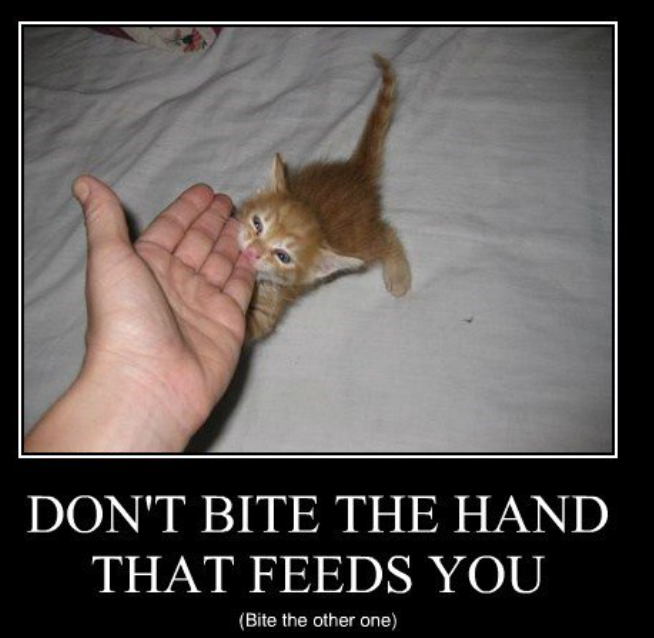
Meaning: This phrase advises against acting badly towards someone who is helping or supporting you.
Example #1: When Tom started complaining about his job, his father gently reminded him, “Don’t bite the hand that feeds you. Remember, it’s your job that pays the bills.”
Example #2: Lisa considered spreading rumors about her friend who had lent her money, but her sister warned, “You shouldn’t do that. Don’t bite the hand that feeds you.”
Example #3: After criticizing his coach who had always supported him, Kevin realized his mistake and thought, “I shouldn’t have done that. Don’t bite the hand that feeds you.”
“Don’t count your chickens before they hatch.”
Meaning: This phrase cautions against assuming success or benefits before they are certain.
Example #1: Emma was already planning how to spend her bonus, but her colleague reminded her, “Don’t count your chickens before they hatch. Wait until it’s confirmed.”
Example #2: Alex was sure he would win the competition and started celebrating early, but his dad said, “Don’t count your chickens before they hatch. Wait for the final results.”
Example #3: Sarah was making plans for a big road trip based on a job interview she felt went well, but her mom advised, “Don’t count your chickens before they hatch. Let’s wait for the offer letter.”
“Don’t put all your eggs in one basket.”
Meaning: This saying advises against risking everything on a single venture or investment and suggests diversifying one’s risks.
Example #1: When Mike wanted to invest all his savings in one stock, his financial advisor said, “Don’t put all your eggs in one basket. It’s safer to spread your investments.”
Example #2: Emily was applying to colleges and her counselor reminded her, “Don’t put all your eggs in one basket. Apply to several to increase your chances of acceptance.”
Example #3: John was so focused on his career in one specialized field, but his mentor suggested, “Don’t put all your eggs in one basket; develop skills in other areas too.”
“Don’t throw the baby out with the bathwater.”
Meaning: This phrase advises against rejecting something valuable or useful along with the undesirable aspects when making a change or decision.
Example #1: While renovating their house, Sarah’s family encountered some challenges with the design plans. However, they made sure to preserve the elements they liked, remembering not to “throw the baby out with the bathwater.”
Example #2: Tom’s company faced difficulties with a new product launch, but instead of scrapping the entire project, they identified and kept the features that were well-received by customers, understanding the importance of not “throwing the baby out with the bathwater.”
Example #3: Emily received feedback on her writing project that included both positive and negative points. She carefully considered the criticism but retained the aspects that aligned with her vision, ensuring she didn’t “throw the baby out with the bathwater.“
“Easy come, easy go.”

Meaning: This phrase means that things gained easily are also lost easily.
Example #1: When Tom won a small amount of money in a lottery and spent it all in one weekend, his brother said, “Well, easy come, easy go.”
Example #2: Lisa got a bonus at work and impulsively bought an expensive phone, only to lose it a week later, leading her friend to comment, “Easy come, easy go.”
Example #3: After quickly gaining followers on social media and then losing them just as fast, Emma realized the truth of the saying, “Easy come, easy go.”
“Every cloud has a silver lining.”
Meaning: This saying suggests that there is something positive or hopeful in every bad situation.
Example #1: When Jack lost his job but found a better opportunity because of it, his mother reminded him, “See, every cloud has a silver lining.”
Example #2: Sarah broke her leg and missed her dance recital, but during her recovery, she discovered a passion for painting. She thought, “Every cloud has a silver lining.”
Example #3: After the storm ruined their outdoor party plans, Emily’s family had a fun indoor game night instead, proving that every cloud has a silver lining.
“Early to bed and early to rise makes a man healthy, wealthy, and wise.”
Meaning: This phrase suggests that maintaining a disciplined sleep schedule and waking up early can lead to improved health, financial success, and intelligence.
Example #1: Sarah prioritized getting enough sleep each night and waking up early to start her day. As a result, she felt more energized and productive, embodying the idea that “early to bed and early to rise makes a man healthy, wealthy, and wise.”
Example #2: Tom decided to adjust his sleep schedule to go to bed earlier and wake up earlier each day. With his newfound morning routine, he found himself more focused and motivated, aligning with the belief that “early to bed and early to rise makes a man healthy, wealthy, and wise.“
Example #3: Emily used to stay up late working on projects, but after adopting a habit of going to bed early and waking up early, she noticed improvements in her overall well-being and productivity, affirming the wisdom of “early to bed and early to rise makes a man healthy, wealthy, and wise.“
“Every dog has his day.”
Meaning: This phrase suggests that everyone will experience success or good fortune at some point in their life, regardless of their circumstances or past failures.
Example #1: Despite facing numerous setbacks in his career, Tom remained optimistic, believing that “every dog has his day” and that his hard work would eventually lead to success.
Example #2: Sarah struggled with self-doubt during her job search, but she remained hopeful, knowing that “every dog has his day” and that the right opportunity would come along eventually.
Example #3: Emily’s perseverance paid off when she finally received recognition for her work, proving the truth of “every dog has his day” as she experienced her moment of triumph after years of dedication.

“Familiarity breeds contempt.”
Meaning: This phrase suggests that extensive knowledge of or close association with someone or something can lead to a loss of respect for them or it.
Example #1: After working in the same office for years, Mike started to find his colleagues’ habits annoying, illustrating how familiarity breeds contempt.
Example #2: Living with her best friend turned out to be challenging for Emma, as small quirks became irritating, a case of familiarity breeding contempt.
Example #3: The more James learned about the inner workings of his favorite political party, the more disillusioned he became, showing that familiarity breeds contempt.
“Fortune favors the bold.”
Meaning: This saying means that people who take risks or are brave are more likely to achieve success than those who do not.
Example #1: Alex decided to start his own business despite the risks, believing in the adage that fortune favors the bold, and it turned out to be a great success.
Example #2: When Sarah chose to travel abroad alone for an adventure, her friends admired her courage, commenting that fortune favors the bold.
Example #3: Kevin submitted his novel to a publisher after years of hesitation, and when it got accepted, he realized that fortune truly favors the bold.
“God helps those who help themselves.”
Meaning: This phrase suggests that self-initiative and effort are necessary to achieve one’s goals, and relying solely on divine intervention without personal action is insufficient.
Example #1: When Tom complained about his poor grades, his mother advised, “You need to study harder. Remember, God helps those who help themselves.”
Example #2: Emily wanted to win the championship, so she trained every day, believing in the principle that God helps those who help themselves, and her hard work paid off.
Example #3: After months of job searching without success, John started improving his skills and finally landed a job, reinforcing the idea that God helps those who help themselves.
“Good things come to those who wait.”
Meaning: This saying suggests that being patient often leads to better outcomes and rewards.
Example #1: Lucy was anxious to get a new puppy, but her parents told her to wait until summer. When she finally got the puppy, she realized that good things come to those who wait.
Example #2: Mark had been saving up for a new bike and was tempted to buy a cheaper one several times. He waited, and eventually, he could afford the bike he really wanted, proving that good things come to those who wait.
Example #3: Emma was the last of her friends to get a smartphone. When she did, it was the latest model, reminding her that good things come to those who wait.
“Haste makes waste.”
Meaning: This phrase means that rushing through something often results in mistakes and leads to poor outcomes or wasted effort.
Example #1: When Alex hurriedly completed his project the night before it was due, he made several errors and had to redo it, learning that haste makes waste.
Example #2: Sarah quickly cleaned her room without paying attention and later found her important notes thrown away, a clear example of how haste makes waste.
Example #3: In his rush to get to the movie theater, Jack forgot his wallet at home, meaning they had to go back to get it, proving that haste makes waste.
“He who laughs last laughs longest.”
Meaning: This saying suggests that the person who has the final success in a situation, even after some setbacks, truly enjoys the victory more than anyone else.
Example #1: Emily was initially mocked for her innovative idea at work, but when it turned out to be a huge success, she knew that he who laughs last laughs longest.
Example #2: Tom’s friends finished their race quickly but with errors, while Tom finished last but with no mistakes. He smiled, realizing he who laughs last laughs longest.
Example #3: When Sarah’s slow but steady approach in her business finally paid off, outperforming her competitors’ quick fixes, she understood the truth in he who laughs last laughs longest.
“Health is wealth.”
Meaning: This phrase emphasizes that good health is as valuable, if not more, than material wealth because without health, one cannot enjoy life fully.
Example #1: After recovering from a long illness, John started exercising regularly and eating healthy, often saying, “Health is wealth.”
Example #2: Lisa chose to walk to work instead of driving to stay fit, reminding herself, “Health is wealth.”
Example #3: Mr. Smith, a wealthy businessman, always prioritized his family’s health check-ups and often remarked, “Remember, health is wealth.”
“Honesty is the best policy.”
Meaning: This phrase means that being truthful is better than lying, even if being honest might seem difficult at the moment.
Example #1: When Tom accidentally broke his neighbor’s window, he decided to tell them the truth, believing that honesty is the best policy, and they appreciated his sincerity.
Example #2: Sarah was tempted to cheat on the test but remembered that honesty is the best policy and chose to do her best without cheating.
Example #3: Kevin confessed to his boss about a mistake he made on the project, following the principle that honesty is the best policy, and his boss commended him for his integrity.

“Hope for the best, prepare for the worst.”
Meaning: This saying advises to remain optimistic about a favorable outcome while also being ready to face and handle the worst possible scenario.
Example #1: While applying for her dream job, Emily also updated her resume and applied for other positions, embodying the idea of hope for the best, prepare for the worst.
Example #2: Before the big game, the team practiced rigorously for tough situations, even though they were hoping for an easy win, following the principle of hope for the best, prepare for the worst.
Example #3: As they planned their outdoor wedding, the couple also arranged for a backup indoor venue, just in case of rain, showing they were hoping for the best but prepared for the worst.
“If it ain’t broke, don’t fix it.”
Meaning: This phrase advises against making unnecessary changes to something that is already functioning well.
Example #1: The old coffee maker may not be fancy, but it makes great coffee, so Emily’s dad always said, “If it ain’t broke, don’t fix it.”
Example #2: When Alex suggested updating the website design, his boss replied, “If it ain’t broke, don’t fix it. Let’s focus on more pressing issues.”
Example #3: Despite complaints about the outdated software, Sarah’s company continued to use it because, as their IT manager put it, “If it ain’t broke, don’t fix it.”
“If the shoe fits, wear it.”
Meaning: This phrase means if something applies or is suitable to you, then accept or acknowledge it.
Example #1: When Tom’s friend teased him about being a perfectionist, Tom simply shrugged and replied, “If the shoe fits, wear it.”
Example #2: Sarah’s sister commented on her procrastination habits, and Sarah laughed and said, “Well, if the shoe fits, wear it.”
Example #3: When Alex was accused of being too competitive, he didn’t deny it, saying, “If the shoe fits, wear it.”
“Ignorance is bliss.”
Meaning: This saying suggests that sometimes it’s better not to know certain things because knowing them might lead to unhappiness or worry.
Example #1: After learning about the risks of climate change, Sarah couldn’t stop worrying, while her friend remained carefree, believing in the idea that ignorance is bliss.
Example #2: When Mike discovered some unsettling truths about his family’s history, he wished he had remained ignorant, realizing the truth in the saying “ignorance is bliss.”
Example #3: Emily chose not to read the news for a while because she found it distressing, embracing the concept that ignorance is bliss to maintain her peace of mind.
“Imitation is the sincerest form of flattery.”
Meaning: This phrase suggests that copying someone or something is a genuine form of admiration and praise.
Example #1: When Sarah noticed her friend wearing a similar outfit to hers, she smiled, knowing that imitation is the sincerest form of flattery.
Example #2: After seeing his colleague adopt his presentation style, Alex felt honored, realizing that imitation is the sincerest form of flattery.
Example #3: Emily was flattered when her younger sister started copying her hairstyle, recognizing that imitation is the sincerest form of flattery.
“In for a penny, in for a pound.”
Meaning: This phrase suggests that once someone is committed to a course of action or decision, they might as well fully commit to it, regardless of the risks or consequences.
Example #1: After investing a small amount of money in a business venture, Tom decided to invest more, thinking, “In for a penny, in for a pound.”
Example #2: Despite facing challenges with the project, Emily decided to continue working on it diligently, reasoning that “In for a penny, in for a pound.”
Example #3: Sarah initially signed up for a small volunteering project, but when she saw the impact it was making, she committed to a larger role, thinking, “In for a penny, in for a pound.”
“It’s no use crying over spilt milk.”
Meaning: This phrase suggests that it’s pointless to be upset about something that has already happened and cannot be changed.
Example #1: After accidentally breaking her favorite mug, Emily’s mom told her, “It’s no use crying over spilt milk,” encouraging her not to dwell on the accident.
Example #2: When Tom realized he missed the deadline for his project, his friend reminded him, “It’s no use crying over spilt milk. Focus on finding a solution instead.”
Example #3: After losing the championship game, Alex’s coach told the team, “It’s no use crying over spilt milk. Let’s learn from our mistakes and work harder next time.”
“It takes two to tango.”
Meaning: This saying implies that cooperation or mutual involvement is necessary for a situation or activity to occur successfully.
Example #1: During a disagreement between friends, one said, “Remember, it takes two to tango,” emphasizing the need for both parties to compromise.
Example #2: When discussing a failed project at work, the manager remarked, “It takes two to tango. Let’s figure out where both sides went wrong.”
Example #3: In a relationship counseling session, the therapist reminded the couple, “It takes two to tango. Both of you need to work on communication and understanding.”

“Jack of all trades, master of none.”
Meaning: This phrase suggests that someone who has knowledge or skills in many areas may not excel or be proficient in any particular one.
Example #1: Although Tom could do various tasks adequately, his friend remarked, “You’re a Jack of all trades, master of none,” noting that he lacked expertise in any specific field.
Example #2: Emily’s resume listed numerous skills, but during the interview, the employer commented, “It seems like you’re a Jack of all trades, master of none,” implying that they preferred more specialized expertise.
Example #3: Despite being able to fix a variety of household appliances, John struggled with complex repairs, leading his wife to affectionately say, “You’re a Jack of all trades, master of none, but I still appreciate your efforts.”
“Keep your friends close and your enemies closer.”
Meaning: This phrase advises to be vigilant and aware of one’s enemies, often by maintaining close contact or observation, to better anticipate their actions and protect oneself.
Example #1: Despite their past conflicts, Sarah decided to invite her rival to a social gathering, adhering to the notion of “keep your friends close and your enemies closer” to better understand her adversary’s intentions.
Example #2: When negotiating a business deal, Tom made sure to maintain frequent communication with his competitor, following the principle of “keep your friends close and your enemies closer” to gather information and avoid being blindsided.
Example #3: Despite her distrust, Emily decided to engage in polite conversation with her colleague whom she suspected of undermining her, believing that “keep your friends close and your enemies closer” was the best strategy to safeguard her position.
“Knowledge is power.”
Meaning: This phrase implies that possessing knowledge or information empowers an individual, enabling them to make informed decisions, influence others, and succeed in various endeavors.
Example #1: Recognizing the importance of education, Sarah dedicated herself to learning new skills, understanding that “knowledge is power” and would open doors to opportunities in her career.
Example #2: Before making a significant investment, Tom thoroughly researched the market, realizing that “knowledge is power” and would enable him to make informed decisions to maximize returns.
Example #3: Emily regularly attends workshops and seminars to expand her expertise, believing that “knowledge is power” and that continuous learning enhances her capabilities in her profession.
“Laughter is the best medicine.”
Meaning: This saying suggests that laughter and a positive outlook can have beneficial effects on one’s physical and mental health, often serving as a remedy for stress, sadness, or other emotional ailments.
Example #1: After a stressful day at work, Sarah watched a comedy show to unwind, believing that “laughter is the best medicine” to alleviate her tension and improve her mood.
Example #2: When Tom was feeling down, his friends organized a game night filled with laughter and jokes, understanding that “laughter is the best medicine” to uplift his spirits and provide comfort during difficult times.
Example #3: Despite facing challenges, Emily maintained a sense of humor and found reasons to laugh daily, embracing the idea that “laughter is the best medicine” to promote her overall well-being and resilience.
“Let sleeping dogs lie.”
Meaning: This phrase advises against interfering in a situation that is currently calm or stable, as doing so could potentially cause trouble or disrupt the peace.
Example #1: When Tom discovered a secret about his friend but realized it wouldn’t affect their friendship, he decided to “let sleeping dogs lie” and kept the information to himself.
Example #2: Despite being tempted to confront his colleague about a minor issue, John chose to “let sleeping dogs lie” and avoid unnecessary conflict in the workplace.
Example #3: Sarah found out her sibling had made a mistake but chose not to bring it up, deciding instead to “let sleeping dogs lie” to maintain harmony within the family.
“Life is what you make it.”
Meaning: This phrase suggests that one’s life experiences and outcomes are largely influenced by their own choices, actions, and attitudes.
Example #1: Despite facing setbacks, Sarah remained optimistic and pursued her dreams, believing firmly that “life is what you make it” and that she could shape her own destiny.
Example #2: Tom decided to leave his comfort zone and pursue a new career path, embracing the idea that “life is what you make it” and taking control of his own future.
Example #3: Emily faced challenges but chose to approach them with resilience and determination, understanding that “life is what you make it” and that she had the power to create a fulfilling and meaningful life for herself.
“Look before you leap.”
Meaning: This phrase advises caution and encourages people to consider the consequences of their actions before acting impulsively.
Example #1: Before signing the contract, Sarah carefully reviewed all the terms and conditions, remembering the advice to “look before you leap” to avoid any potential pitfalls.
Example #2: Tom hesitated before accepting the job offer, taking the time to research the company and weigh his options, mindful of the wisdom to “look before you leap.”
Example #3: Emily paused before making a major purchase, considering her budget and needs, realizing the importance of “looking before you leap” to make informed decisions.
“Love is blind.”
Meaning: This saying suggests that when someone is in love, they may overlook faults or flaws in the object of their affection.
Example #1: Despite her friends’ warnings about her partner’s behavior, Sarah remained devoted, demonstrating that “love is blind.”
Example #2: Tom’s family had reservations about his girlfriend, but he couldn’t see any flaws, believing in the adage that “love is blind.”
Example #3: Emily’s friends were concerned about her relationship, but she dismissed their worries, convinced that “love is blind” and that her partner was perfect for her.
“Make hay while the sun shines.”
Meaning: This phrase advises taking advantage of favorable conditions or opportunities while they are available.
Example #1: With the economy booming, Tom decided to invest in stocks, remembering the advice to “make hay while the sun shines” to maximize his profits.
Example #2: Sarah decided to complete her outdoor chores during the sunny weather, knowing that she should “make hay while the sun shines” before the forecasted rain arrived.
Example #3: Emily seized the opportunity to travel while she had the time and resources, understanding the importance of “making hay while the sun shines” to enjoy life’s experiences to the fullest.
“Misery loves company.”
Meaning: This phrase suggests that people who are unhappy or miserable often seek out others who are similarly unhappy, perhaps for mutual commiseration or to validate their own feelings.
Example #1: After a difficult breakup, Sarah found solace in spending time with her friend who was also going through a tough time, realizing that “misery loves company.”
Example #2: Tom noticed that whenever he complained about work, his colleague would join in, confirming the belief that “misery loves company.”
Example #3: Emily observed that her classmates who struggled with a certain subject tended to form study groups together, understanding the truth behind the saying “misery loves company.”
“Money doesn’t grow on trees.”
Meaning: This phrase is used to convey the idea that money is not easily obtained and requires effort and hard work to earn.
Example #1: When Tom asked for an expensive toy, his parents reminded him, “Money doesn’t grow on trees,” teaching him the value of financial responsibility.
Example #2: Sarah wanted to buy a designer handbag but realized she needed to save up for it, understanding that “money doesn’t grow on trees” and she needed to be mindful of her spending.
Example #3: Emily’s friend asked to borrow some cash, and she hesitated, explaining, “I have to work hard for my money. Remember, money doesn’t grow on trees.”
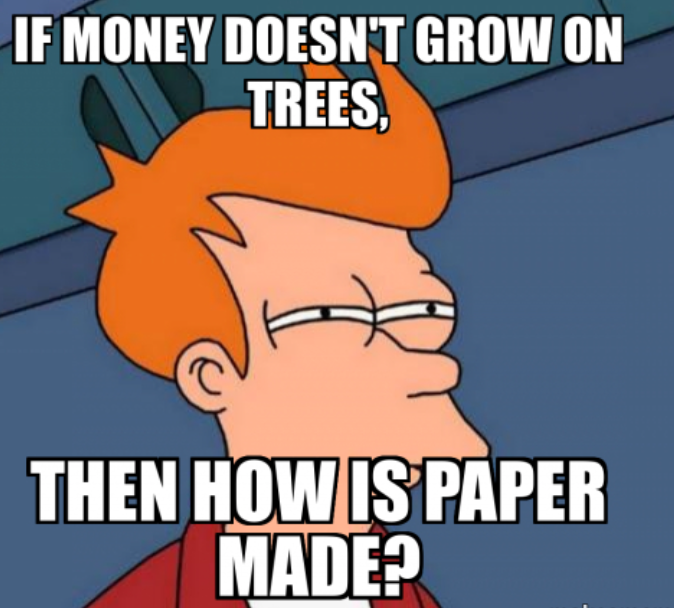
“Necessity is the mother of invention.”
Meaning: This phrase suggests that challenges or needs often inspire creative solutions or innovations.
Example #1: When faced with a power outage, Tom invented a makeshift solar-powered lamp, demonstrating the truth in the saying “necessity is the mother of invention.”
Example #2: Sarah, frustrated with the limited storage space in her apartment, came up with a clever organizing system, inspired by the notion that “necessity is the mother of invention.”
Example #3: Emily’s smartphone broke, prompting her to develop a simple app to solve a common problem, proving once again that “necessity is the mother of invention.”
“No man is an island.”
Meaning: This phrase emphasizes the interconnectedness of people and suggests that individuals are not entirely independent but rely on others for support, companionship, and cooperation.
Example #1: When facing a difficult situation, Tom reached out to his friends for help, recognizing that “no man is an island” and that he needed their support.
Example #2: Sarah appreciated the assistance of her colleagues at work, understanding that “no man is an island” and that collaboration and teamwork were essential for success.
Example #3: Emily enjoyed spending time with her family and friends, acknowledging the truth in the saying “no man is an island” and valuing the relationships that enriched her life.
“No news is good news.”
Meaning: This phrase suggests that in certain situations, the absence of communication or information can be interpreted positively, indicating that there are no problems or issues to report.
Example #1: After her job interview, Sarah anxiously awaited a response. When she didn’t hear back immediately, she comforted herself with the thought that “no news is good news,” assuming that silence indicated a positive outcome.
Example #2: Tom’s parents were traveling abroad, and he hadn’t received any updates from them. While initially concerned, he reminded himself that “no news is good news,” trusting that they were safe and enjoying their trip.
Example #3: Emily had submitted a proposal for a project but hadn’t received any feedback yet. Rather than worrying about the lack of response, she reassured herself with the belief that “no news is good news,” assuming that her proposal was being considered positively.
“No pain, no gain.”
Meaning: This phrase suggests that significant achievements or improvements often require hard work, sacrifice, or discomfort.
Example #1: Despite the grueling training sessions, Tom pushed himself to his limits, knowing that “no pain, no gain” was the key to becoming a stronger athlete.
Example #2: Sarah endured long hours of studying for her exams, believing firmly in the principle that “no pain, no gain,” understanding that her efforts would lead to academic success.
Example #3: Emily embarked on a rigorous fitness regimen, acknowledging that “no pain, no gain” meant she had to endure physical discomfort to achieve her fitness goals.
“Not all that glitters is gold.”
Meaning: This phrase suggests that appearances can be deceiving, and just because something looks attractive or valuable doesn’t mean it is.
Example #1: Despite the flashy advertisement, Sarah researched the product thoroughly, remembering that “not all that glitters is gold” and ensuring she made an informed purchase.
Example #2: Tom was initially impressed by the luxurious lifestyle of his new acquaintance, but he reminded himself that “not all that glitters is gold” and stayed cautious about forming close relationships.
Example #3: Emily’s friend bought an expensive car, but Emily cautioned her, saying, “Remember, not all that glitters is gold. Make sure you consider all the costs involved.”
“Old habits die hard.”
Meaning: This phrase suggests that it is difficult to change or abandon long-standing habits or behaviors, even if they are undesirable or harmful.
Example #1: Despite his efforts to quit smoking, Tom found it challenging to resist the urge to smoke when he was stressed, realizing that “old habits die hard.”
Example #2: Sarah tried to adopt a healthier lifestyle by exercising regularly, but she struggled to break her habit of eating unhealthy snacks, acknowledging that “old habits die hard.”
Example #3: Despite Emily’s intention to manage her time better, she found herself procrastinating as usual, recognizing the truth in the saying “old habits die hard.”
“One man’s trash is another man’s treasure.”
Meaning: This phrase suggests that something considered worthless or undesirable by one person may be highly valued or useful to someone else.
Example #1: While cleaning out her attic, Sarah found some old furniture she was planning to throw away. Her friend, however, saw potential in the pieces, remarking, “One man’s trash is another man’s treasure,” and offered to refurbish them.
Example #2: Tom was about to discard some vintage vinyl records he found at a garage sale, but his neighbor, a collector, eagerly offered to buy them, proving the saying “one man’s trash is another man’s treasure.”
Example #3: Emily decided to donate her old clothes to a thrift store, realizing that “one man’s trash is another man’s treasure” and that someone else might appreciate and make good use of them.
“Practice makes perfect.”
Meaning: This phrase suggests that consistent repetition and effort lead to improvement and mastery in a particular skill or activity.
Example #1: Despite struggling with her piano lessons, Sarah continued to practice diligently, understanding that “practice makes perfect” and that she would eventually become a skilled pianist with perseverance.
Example #2: Tom spent hours practicing free throws on the basketball court every day, believing in the principle that “practice makes perfect” and striving to enhance his shooting technique.
Example #3: Emily dedicated herself to mastering a new language by practicing speaking and listening regularly, embracing the idea that “practice makes perfect” and steadily improving her proficiency over time.
“Prevention is better than cure.”
Meaning: This phrase emphasizes the importance of taking proactive measures to avoid problems or illnesses, rather than dealing with them after they occur.
Example #1: Sarah prioritized healthy eating and regular exercise to prevent health issues, believing firmly that “prevention is better than cure.”
Example #2: Tom installed a security system in his home to deter burglars, understanding that “prevention is better than cure” and that it’s easier to prevent a break-in than deal with the aftermath.
Example #3: Emily scheduled regular check-ups with her dentist to maintain good oral health, recognizing the wisdom in the saying “prevention is better than cure” and seeking to avoid dental problems before they arise.
“Pride comes before a fall.”
Meaning: This phrase suggests that excessive pride or arrogance often precedes a downfall or failure.
Example #1: Despite warnings from his teammates, Tom overestimated his abilities and suffered a humiliating defeat in the match, learning the hard way that “pride comes before a fall.”
Example #2: Sarah’s arrogance led her to ignore valuable advice from her colleagues, resulting in a costly mistake at work, reminding her that “pride comes before a fall.”
Example #3: Emily’s overconfidence in her academic abilities caused her to neglect studying for an important exam, and she ended up performing poorly, realizing the truth in the saying “pride comes before a fall.”
“Rome wasn’t built in a day.”
Meaning: This phrase emphasizes that significant achievements or complex tasks require time, patience, and persistent effort.
Example #1: Despite feeling discouraged by the slow progress of her business, Sarah reminded herself that “Rome wasn’t built in a day,” staying motivated to work towards her long-term goals.
Example #2: Tom started a new fitness regimen and was frustrated by the lack of immediate results. However, he kept reminding himself that “Rome wasn’t built in a day,” staying committed to his fitness journey.
Example #3: Emily felt overwhelmed by the challenges of learning a new skill, but she persevered, understanding that “Rome wasn’t built in a day” and trusting in the process of gradual improvement.
“Silence is golden.”
Meaning: This phrase suggests that sometimes it is better to remain silent, as silence can be valuable, calming, or wise.
Example #1: During a heated argument, Sarah chose to stay silent instead of escalating the situation, understanding that “silence is golden” and that speaking in anger could make things worse.
Example #2: Tom found solace in the quiet of nature, appreciating the peacefulness and understanding the value of “silence is golden” for calming his mind.
Example #3: Emily listened attentively during a meeting, refraining from speaking until she had carefully considered her thoughts, recognizing the wisdom in the saying “silence is golden” for thoughtful communication.
“Slow and steady wins the race.”
Meaning: This phrase emphasizes the importance of perseverance, patience, and steady progress in achieving success, rather than rushing or taking shortcuts.
Example #1: Despite initial setbacks, Sarah remained committed to her studies, knowing that “slow and steady wins the race” and that consistent effort would lead to academic success.
Example #2: Tom focused on gradually building his savings over time, understanding that “slow and steady wins the race” when it comes to achieving financial stability.
Example #3: Emily approached her fitness goals with patience and persistence, believing in the principle that “slow and steady wins the race” and that gradual improvements would lead to long-term health and fitness.
“Still waters run deep.”
Meaning: This phrase suggests that individuals who appear calm and quiet on the surface often have profound thoughts, emotions, or complexities beneath the surface.
Example #1: Despite her reserved demeanor, Sarah surprised her colleagues with her insightful analysis during a team meeting, demonstrating the truth in the saying “still waters run deep.”
Example #2: Tom’s unassuming appearance belied his deep understanding of complex topics, revealing the depth of his knowledge and reinforcing the idea that “still waters run deep.”
Example #3: Emily’s calm demeanor masked her strong determination and resilience, showing that appearances can be deceiving and exemplifying the saying “still waters run deep.”

“Strike while the iron is hot.”
Meaning: This phrase advises taking advantage of an opportunity promptly, while conditions are favorable and circumstances are conducive to success.
Example #1: When Tom received a job offer from his dream company, he accepted it immediately, understanding the importance of “striking while the iron is hot” to seize the opportunity.
Example #2: Sarah decided to launch her business idea after receiving positive feedback from potential customers, recognizing the need to “strike while the iron is hot” and capitalize on the market’s interest.
Example #3: Emily submitted her manuscript to a publisher while interest in her genre was high, knowing that she needed to “strike while the iron is hot” to increase her chances of success in the competitive publishing industry.
“The best things in life are free.”
Meaning: This phrase suggests that the most valuable or meaningful aspects of life, such as love, friendship, and happiness, cannot be bought with money.
Example #1: Sarah cherished spending time with her family outdoors, realizing that “the best things in life are free” and that simple moments together brought the most joy.
Example #2: Tom found fulfillment in volunteering and helping others in need, understanding that “the best things in life are free” and that acts of kindness and generosity were priceless.
Example #3: Emily appreciated the beauty of nature and the serenity it provided, recognizing that “the best things in life are free” and that moments of tranquility brought her inner peace and contentment.
“The early bird catches the worm.”
Meaning: This phrase suggests that those who act promptly or arrive early are more likely to succeed or obtain opportunities.
Example #1: Sarah woke up early to study for her exam and scored the highest grade in the class, proving that “the early bird catches the worm.”
Example #2: Tom arrived at the job interview ahead of schedule and impressed the interviewer with his preparedness, illustrating the truth in the saying “the early bird catches the worm.”
Example #3: Emily submitted her scholarship application weeks before the deadline and was awarded the scholarship, demonstrating the importance of being proactive and showing that “the early bird catches the worm.”
“The end justifies the means.”
Meaning: This phrase suggests that achieving a positive outcome or goal is more important than the methods or actions used to attain it, even if those methods are morally questionable.
Example #1: Despite facing criticism for his ruthless business tactics, Tom justified his actions by claiming that “the end justifies the means” because they led to increased profits for his company.
Example #2: Sarah decided to cheat on her exam to secure a high grade, believing that “the end justifies the means” because it would improve her academic record and future opportunities.
Example #3: Emily lied to her friend to protect her feelings, arguing that “the end justifies the means” because it prevented unnecessary harm and maintained their friendship.
“The grass is always greener on the other side.”
Meaning: This phrase suggests that people often perceive others’ situations as more desirable than their own, even though this perception may not reflect reality.
Example #1: Despite her successful career, Sarah often envied her friend’s seemingly carefree lifestyle, realizing that “the grass is always greener on the other side.”
Example #2: Tom was considering changing jobs because he thought his colleague had a better position, but he remembered that “the grass is always greener on the other side” and decided to focus on improving his current situation instead.
Example #3: Emily was unhappy with her small apartment until she visited a friend’s house and realized that “the grass is always greener on the other side,” appreciating what she had more.
“The pen is mightier than the sword.”
Meaning: This phrase suggests that writing, communication, and ideas have more power and influence than military force or violence.
Example #1: Rather than resorting to violence, Sarah used her writing skills to advocate for social change, demonstrating the truth in the saying “the pen is mightier than the sword.”
Example #2: Tom decided to address his grievances through a well-written letter rather than confrontational actions, believing in the power of diplomacy and communication encapsulated in “the pen is mightier than the sword.”
Example #3: Emily’s powerful speech moved the audience to action, proving that “the pen is mightier than the sword” by inspiring change through words rather than force.
“The proof of the pudding is in the eating.”
Meaning: This phrase suggests that the true value or quality of something can only be judged or determined by experiencing or testing it firsthand.
Example #1: Despite its impressive appearance, Sarah reserved judgment on the new recipe until she tasted it, remembering that “the proof of the pudding is in the eating.”
Example #2: Tom was skeptical about the effectiveness of the new software, but after trying it out, he realized that “the proof of the pudding is in the eating” and found it to be highly efficient.
Example #3: Emily hesitated to endorse the product until she had used it herself, understanding that “the proof of the pudding is in the eating” and wanting to ensure its quality before recommending it to others.
“There’s no place like home.”
Meaning: This phrase conveys the idea that one’s own home is the most comfortable, familiar, and cherished place, offering a sense of security, belonging, and contentment.
Example #1: After a long trip, Sarah returned home, feeling relieved and comforted by the familiar surroundings, acknowledging that “there’s no place like home.”
Example #2: Tom enjoyed traveling, but he always looked forward to coming back to the warmth and comfort of his own home, understanding the sentiment behind “there’s no place like home.”
Example #3: Emily missed her family and the coziness of her home while studying abroad, realizing the truth in the saying “there’s no place like home” as she longed to return.
“Time is money.”
Meaning: This phrase emphasizes the value of time, suggesting that time is a valuable resource that should be used efficiently, similar to how money is managed.
Example #1: Sarah prioritized her tasks and managed her time wisely, recognizing that “time is money” and that wasting time would ultimately affect her productivity and success.
Example #2: Tom decided to delegate certain tasks to save time and increase his productivity, understanding the importance of the saying “time is money” in his professional life.
Example #3: Emily invested her time in learning new skills that would enhance her career prospects, realizing that “time is money” and that self-improvement was a valuable investment in her future.
“Time heals all wounds.”
Meaning: This phrase suggests that with the passage of time, emotional pain or distress tends to lessen, and healing occurs.
Example #1: Despite experiencing a painful breakup, Sarah found solace in the belief that “time heals all wounds,” trusting that with time, she would eventually move on and find happiness again.
Example #2: Tom struggled to cope with the loss of a loved one, but he took comfort in the idea that “time heals all wounds,” knowing that over time, the pain would gradually fade, and he would find peace.
Example #3: Emily faced setbacks in her career, but she remained hopeful, remembering the saying “time heals all wounds” and believing that with time, she would overcome the challenges and emerge stronger.

“To err is human; to forgive, divine.”
Meaning: This phrase acknowledges that making mistakes is a natural part of being human, while forgiving others for their mistakes requires a higher level of compassion and understanding.
Example #1: Despite the hurt caused by her friend’s actions, Sarah chose to forgive her, recognizing that “to err is human; to forgive, divine” and understanding the importance of forgiveness in maintaining their friendship.
Example #2: Tom realized that holding onto resentment was causing him more harm than good, so he decided to forgive his coworker for their mistake, embracing the idea that “to err is human; to forgive, divine.”
Example #3: Emily struggled to forgive herself for past mistakes, but she eventually learned to show herself compassion, remembering the saying “to err is human; to forgive, divine” and understanding the importance of self-forgiveness in personal growth.
“Too many cooks spoil the broth.”
Meaning: This phrase suggests that when too many people are involved in a task or project, it can lead to confusion, inefficiency, or a lower-quality outcome.
Example #1: Sarah’s group project suffered from conflicting ideas and lack of coordination because everyone wanted to take the lead, demonstrating the truth in the saying “too many cooks spoil the broth.”
Example #2: Tom’s attempt to involve multiple teams in the decision-making process resulted in delays and disagreements, highlighting the risk of “too many cooks spoil the broth” in project management.
Example #3: Emily’s family reunion dinner ended in chaos as everyone tried to contribute their own dishes, illustrating the adage “too many cooks spoil the broth” as the meal lacked cohesion and flavor.
“Two heads are better than one.”
Meaning: This phrase suggests that collaboration or teamwork can lead to better ideas, solutions, or outcomes than working alone.
Example #1: Sarah and Tom worked together on a challenging project, pooling their ideas and expertise, and achieved greater success, demonstrating the truth in the saying “two heads are better than one.”
Example #2: Emily and her colleague brainstormed ideas for a new marketing campaign, and their combined creativity resulted in a more innovative and effective strategy, proving that “two heads are better than one.”
Example #3: During a group discussion, Sarah and Tom shared different perspectives on the issue, leading to a more comprehensive understanding and solution, highlighting the benefit of teamwork with the phrase “two heads are better than one.”
“Two wrongs don’t make a right.”
Meaning: This phrase suggests that it is not justified to respond to a wrongdoing with another wrongdoing, as it does not correct the initial injustice and can lead to further harm.
Example #1: Despite being provoked by his classmate, Tom chose not to retaliate with insults or aggression, understanding that “two wrongs don’t make a right” and opting for a peaceful resolution instead.
Example #2: Sarah refrained from spreading rumors about her coworker, even though she had been the target of gossip herself, realizing that “two wrongs don’t make a right” and deciding to break the cycle of negativity.
Example #3: Emily apologized sincerely to her friend after an argument, acknowledging her mistake and understanding that “two wrongs don’t make a right,” as responding with hostility would only escalate the situation.
“Variety is the spice of life.”
Meaning: This phrase suggests that having diverse experiences, interests, or options makes life more interesting, enjoyable, and fulfilling.
Example #1: Sarah loved trying new foods from different cultures, believing that “variety is the spice of life” and enjoying the culinary adventures it brought.
Example #2: Tom enjoyed pursuing various hobbies, from hiking to painting, understanding that “variety is the spice of life” and appreciating the richness it added to his daily routine.
Example #3: Emily embraced opportunities to travel to different destinations, recognizing that “variety is the spice of life” and relishing the unique experiences and perspectives each place offered.
“Waste not, want not.”
Meaning: This phrase advises against wasting resources or being wasteful, as doing so may lead to shortages or a lack of necessities in the future.
Example #1: Sarah learned to be mindful of her food consumption, avoiding waste by planning meals carefully and using leftovers efficiently, guided by the principle of “waste not, want not.”
Example #2: Tom repaired and reused items instead of discarding them, recognizing the importance of “waste not, want not” in conserving resources and reducing unnecessary expenses.
Example #3: Emily practiced sustainability by recycling and repurposing materials whenever possible, understanding that “waste not, want not” was essential for preserving the environment and minimizing waste.
“What goes around comes around.”
Meaning: This phrase suggests that the consequences of one’s actions, whether good or bad, will eventually return to them.
Example #1: Sarah always treated others with kindness and respect, believing in the principle that “what goes around comes around” and trusting that her positive actions would be reciprocated.
Example #2: Tom cheated his colleagues out of a promotion, but later found himself facing similar unfair treatment from his own supervisor, experiencing firsthand how “what goes around comes around.”
Example #3: Emily helped a friend in need without expecting anything in return, knowing that “what goes around comes around” and feeling confident that her generosity would be rewarded in unexpected ways.
“When in Rome, do as the Romans do.”
Meaning: This phrase advises adapting to the customs, behaviors, or practices of a particular place or culture when visiting or living there.
Example #1: While traveling abroad, Sarah embraced local customs and traditions, following the principle of “when in Rome, do as the Romans do” to show respect and immerse herself in the local culture.
Example #2: Tom moved to a new country for work and made an effort to learn the language and customs, understanding the importance of “when in Rome, do as the Romans do” to integrate into the community and build positive relationships.
Example #3: Emily attended a cultural festival in a foreign city and participated in the festivities with enthusiasm, embracing the spirit of “when in Rome, do as the Romans do” to fully experience and appreciate the local culture.
“Where there’s a will, there’s a way.”
Meaning: This phrase suggests that if someone is determined and motivated enough to achieve something, they will find a solution or overcome obstacles to accomplish their goal.
Example #1: Despite facing numerous challenges, Sarah was determined to pursue her dream career, firmly believing in the principle that “where there’s a will, there’s a way,” and persevering until she achieved success.
Example #2: Tom encountered setbacks while starting his own business, but his unwavering determination and belief in the saying “where there’s a will, there’s a way” drove him to find creative solutions and ultimately succeed.
Example #3: Emily faced criticism and doubt from others when she decided to pursue her passion for art, but her strong will and conviction in the notion that “where there’s a will, there’s a way” motivated her to overcome obstacles and pursue her dreams relentlessly.
“You can’t judge a book by its cover.”
Meaning: This phrase suggests that one should not form opinions or make assumptions about someone or something based solely on outward appearance, as it may not accurately reflect their true nature or value.
Example #1: Despite his intimidating appearance, Tom was actually a kind-hearted person, demonstrating the truth in the saying “you can’t judge a book by its cover.”
Example #2: Sarah was initially skeptical about the new restaurant’s modest exterior, but after trying their food, she realized that “you can’t judge a book by its cover” and found it to be delicious.
Example #3: Emily’s classmates underestimated her abilities because of her quiet demeanor, but she proved them wrong by excelling in her studies, showing that “you can’t judge a book by its cover.”
“You can’t make an omelet without breaking eggs.”
Meaning: This phrase suggests that achieving something significant or worthwhile often requires making sacrifices or enduring hardships along the way.
Example #1: Despite the challenges involved, Sarah was determined to renovate her house, understanding that “you can’t make an omelet without breaking eggs” and accepting the temporary inconvenience for the long-term improvement.
Example #2: Tom knew that expanding his business would require taking risks and making difficult decisions, acknowledging the truth in the saying “you can’t make an omelet without breaking eggs” and embracing the challenges as part of the growth process.
Example #3: Emily decided to pursue her dream career in a competitive field, knowing that it would involve hard work and perseverance, but believing that “you can’t make an omelet without breaking eggs” and accepting the sacrifices necessary to achieve her goals.

“You can’t teach an old dog new tricks.”
Meaning: This phrase suggests that it can be difficult to change or teach new skills to someone who is set in their ways or accustomed to certain habits.
Example #1: Despite her father’s best efforts, Sarah found it challenging to teach him how to use a smartphone, realizing the truth in the saying “you can’t teach an old dog new tricks” as he struggled to adapt to the new technology.
Example #2: Tom’s grandfather refused to learn how to drive, believing the adage “you can’t teach an old dog new tricks” and preferring to rely on traditional modes of transportation he was familiar with.
Example #3: Emily’s coworker resisted learning new software programs, citing the saying “you can’t teach an old dog new tricks” as an excuse for sticking to outdated methods, even though it hindered productivity.
“You reap what you sow.”
Meaning: This phrase implies that the consequences of one’s actions, whether good or bad, will eventually come back to them.
Example #1: Sarah always treated others with kindness and generosity, and she found that people were similarly kind to her, illustrating the saying “you reap what you sow.”
Example #2: Tom neglected his studies and focused on partying instead, and as a result, he failed his exams, experiencing firsthand how “you reap what you sow.”
Example #3: Emily invested time and effort in nurturing her relationships, and she was rewarded with strong bonds and support when she needed it most, demonstrating the principle of “you reap what you sow.”
